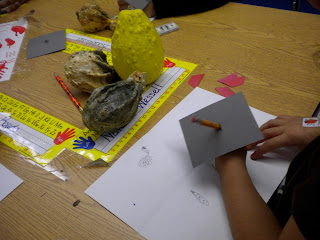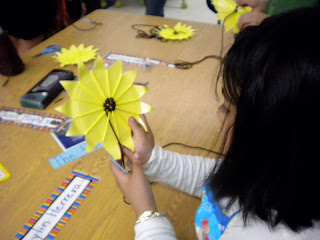First, I want to highly recommend the PBS documentary,
"Where do the children play?" by Elizabeth Goodenough. It addresses the impact today's societal norms have on children, with special attention to time spent outdoors and with unstructured play. very interesting stuff--for teachers and parents. I have it and am happy to lend if you're interested, let me know.
After seeing this movie in September, I have paid more attention to the unstructured play of my primates--informally, but I have accumulated enough "mental notes" to require some written, so here it is:
Several months ago, I heard rumblings amongst the primates about a rock club game or something they were doing at recess. I don't remember exactly how I found out about it, but it seemed interesting, so I began listening more carefully. I acknowledged that I knew about it, but didn't ask too much and didn't express any real interest, as I wanted to really investigate this "undercover". I learned that two of my quietest, sweet, team player primates were the founders of the club--in their words..."they started it!" These primates were also the leaders of the club, whose membership spans other k/1/2 classrooms and includes most of mine.
They always re-enter the classroom after recess chattering about the rock club, so one day I asked a primate what exactly they did in the rock club. It was a classic reply: he looked at me wide-eyed, and in a complete "duh Mrs. G" tone of voice said, "We mine..."...like what the heck else would they do in a rock club? This got me too curious to just observe & eavesdrop any longer.
I found out that there was a huge membership, but that not everyone plays rock club every day. Also, that if you don't play for 2 consecutive days without letting either of the leaders know you'll be doing something else, you're OUT. But they are pretty flexible with letting you back in if you ask nicely, and promise to check in to avoid the 2 absence penalty.
Now when I told my husband this story, he asked, "What are they running, the mafia?!" He didn't like the idea of kids having to report to other kids. But honestly, I think it is amazing and wonderful. This is how the real world works. They have established this whole complex mini-adult society out at recess that involves leaders and workers, consequences for breaking the rules, and second (sometimes fourth and fifth chances)....and, let's not forget, they MINE!
I brought in some rocks I collected at the beach last weekend to donate to the rock club, wanting to support their mining endeavors, but they told me "thank you, but we can't take them." when I asked why not, they said the older kids would throw them and move them around. it would just be too hard to hide them all. wow. so instead they each chose a rock to keep in their bin at school. very interesting.....
There has been one primate who was getting kicked out weekly for crushing all the rocks or making it hard to dig. Sometimes, they said, he fools around too much and they can't get their work done. The first time he was kicked out, he was very upset, so I got involved. We talked it out with the leaders, and I asked them to give the ousted primate a second chance. I also validated their points and told him if he violated the expectations of the club, then he couldn't be in it. He's had a few "issues" here and there, but has remained a member.
I love that they are doing this...there's even a proposed cook out at one of the member's houses after school. I spied a guest list in the making today, and they've discussed it with me. I have noticed that when I do show interest and ask questions, they tend to seek my intervention for issues & problems--but I don't budge. This is their thing and I am staying out of it. I trust them to handle it--after all, they started it all on their own. I'm just nosey...and impressed. And not invited to the cook out!
The movie I mentioned addresses the inability of children today to do exactly what these primates have done. And I agree with the movie--whole-heartedly--kids cannot structure their own time the ways kids could 30 years ago: jump rope, kickball, boys catch the girls, or my personal favorite from 1st grade, girls catch the boys...it always ends in someone getting hurt--physically or emotionally or both, or else it gets so out of control adult intervention is needed. But this group of primates is doing it...how are they doing it? what makes them different and able to navigate these complex social systems? Of course, they still need guidance here and there, but I am learning sooooo much about who they are in their "real world", which enriches my perspective on them when I'm leading the group, where they exhibit very different roles and social structures.
I asked a few of the members once why they felt the two leaders were good leaders--words they had used to describe them in conversation. They replied, "They're really nice, and fair." If only we could say that about the leaders in our adult "real world".....










































